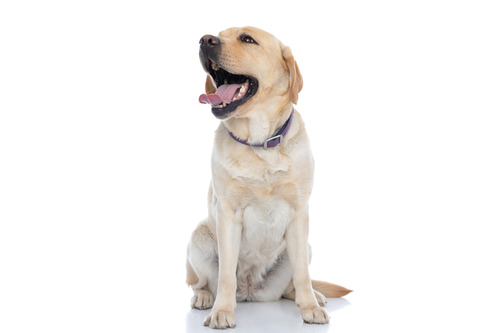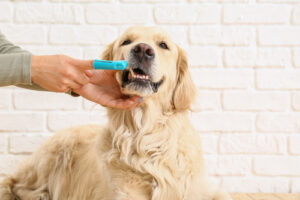Panting is something every dog owner notices, but it can be confusing to know whether it’s normal or a sign of something more serious. Dogs pant for many different reasons, ranging from natural cooling to signs of stress or discomfort. Because panting is one of the most common behaviors in dogs, it’s worth taking a closer look at why it happens and what it could mean for your pet. In this blog, we’ll discuss the most common causes of dog panting, when you should pay closer attention, and how your veterinarian can help. If you ever feel uncertain about your pet’s panting, contact Dix Hills Animal Hospital at (631) 271-8383 or book an appointment online today. Our veterinary team in Huntington, NY, is here to provide expert guidance.
Normal Reasons for Dog Panting
Not all panting signals a problem. In many cases, dog panting is simply a natural response to everyday activities or environmental changes.
Cooling the Body
Unlike humans, dogs don’t sweat all over their bodies. Instead, they release heat through their paw pads and primarily regulate their temperature by panting. Rapid breathing allows moisture to evaporate from their tongue and airway, which helps them cool down. You’ll often notice panting after a walk on a warm day or a playful session at the park.
Exercise and Activity
After running, playing fetch, or even a long walk, dog panting is expected. It shows your pet is exerting themselves and working to bring their body temperature back to normal. Once they rest and rehydrate, their breathing usually returns to a calmer pace.
Excitement and Happiness
Panting isn’t always tied to temperature. Many dogs pant when they’re excited like when you come home from work or when they meet new people. Their body responds to heightened emotions with an increased heart rate and faster breathing, which can look very similar to panting from exercise.
When Panting May Indicate Stress or Anxiety
While panting can be normal, it may also be linked to emotional responses. Dogs use panting as a way to cope with feelings of unease or nervousness.
Signs of Stress-Related Panting
If your dog pants heavily in situations like thunderstorms, car rides, or visits to the vet, it could point to anxiety. Other signs may include pacing, whining, drooling, or seeking constant reassurance. Stress-related panting often appears suddenly, even without exercise or heat as a trigger.
Separation Anxiety and Panting
Some dogs struggle when left alone. Separation anxiety can cause excessive dog panting, vocalization, destructive behavior, and restlessness. This type of panting happens because the dog is emotionally distressed rather than physically overheated.
Identifying Triggers
Recognizing the specific events or environments that cause your dog to pant can help you and your veterinarian determine whether stress is a factor. Keeping track of when panting happens is a valuable detail to share during an exam.
Health Conditions That Can Cause Dog Panting
In some cases, dog panting may be a signal that something more serious is going on. While it’s natural after play or excitement, panting that seems excessive, frequent, or unusual can sometimes point to underlying medical issues.
Respiratory Concerns
Dogs with respiratory conditions may pant more because their bodies are struggling to get enough oxygen. Noisy breathing, coughing, or difficulty exercising can sometimes accompany this type of panting.
Heart Disease
Cardiac conditions may also lead to frequent or heavy panting. The heart works harder to circulate oxygen through the body, and panting can be a way for the dog to cope. Other signs may include fatigue, reduced interest in exercise, or coughing at rest.
Pain or Discomfort
Panting can be a dog’s way of showing pain. Whether from an injury, arthritis, or another source of discomfort, some pets pant more often when they aren’t feeling well. This type of panting may appear suddenly, without an obvious trigger like exercise or heat.
Hormonal or Metabolic Disorders
Conditions such as Cushing’s disease can cause increased dog panting, along with changes in appetite, thirst, and weight. Metabolic issues can alter the way a dog’s body regulates energy and temperature, which may explain frequent panting episodes.
Environmental Causes of Dog Panting
Not all excessive panting is tied to health conditions. The environment around your dog can also play a big role.
Heat Exposure
Hot weather is one of the most common reasons for dog panting. Even moderate temperatures can be difficult for dogs, especially those with thick coats or shorter snouts. Extended time outdoors, direct sunlight, or lack of shade can all increase panting.
Breed Differences
Brachycephalic breeds like Bulldogs, Pugs, and Shih Tzus are more prone to panting because of their shortened airways. Their anatomy makes it harder to cool down efficiently, which can lead to more frequent panting than other breeds.
Obesity and Panting
Overweight dogs may pant more because their bodies require extra effort to move and regulate temperature. Carrying additional weight can make even light exercise or warm weather more challenging.
When to Talk to Your Huntington Veterinarian About Dog Panting
It’s normal for dogs to pant, but some situations call for veterinary evaluation. Knowing when to schedule an exam can help you feel confident about your pet’s health.
Warning Signs to Watch For
Contact your veterinarian at Dix Hills Animal Hospital if your dog’s panting:
- Seems excessive or out of proportion to activity
- Happens at rest or in cool environments
- Is accompanied by coughing, wheezing, or labored breathing
- Comes with sudden changes in appetite, behavior, or energy
- Involves visible discomfort, such as restlessness or whining
Why an Exam is Important
Your veterinarian can determine whether dog panting is normal or related to a health concern. A physical exam, medical history, and possibly diagnostic testing can help identify the underlying cause. From there, the right care plan can be developed to support your pet.
Supporting Your Dog’s Health in Huntington, NY
Panting is one of the most common behaviors dogs display, but it can mean very different things depending on the situation. While it often reflects normal cooling or excitement, sometimes dog panting can point to stress, environmental challenges, or medical conditions that require attention. If you notice changes in your dog’s panting, the team at Dix Hills Animal Hospital is equipped to help. Call us today at (631) 271-8383 or book an appointment online to schedule a visit. Our veterinary professionals in Huntington, NY, will provide the care your pet needs and answer all your questions about panting, behavior, and overall health.





